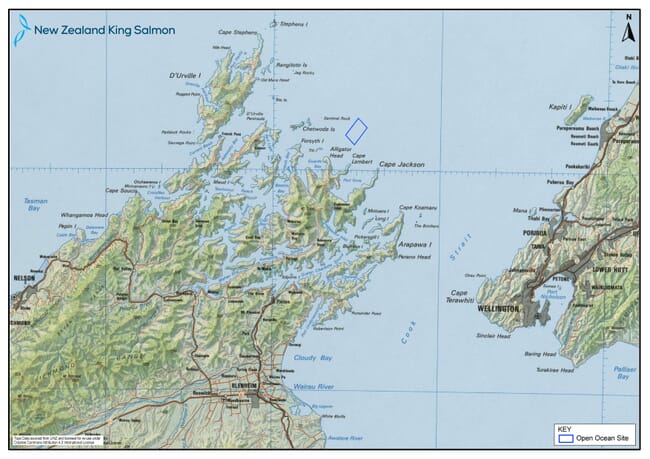The company, which currently produces 8,000 tonnes of king salmon (Oncorhynchus tshawytscha), which are also known as Chinook salmon, has applied for consent to establish at least one site in the Cook Straight, 7km from the nearest landfall.

If approved, the company intends to commission an initial farm with the potential to grow 4,000 tonnes of king salmon – about twice the output of its largest of its eight existing farms – as the next step in furthering its 10 year goal of commercialising open ocean salmon farming in New Zealand.
A statement from the Marlborough-based company explains that an application for a 35-year resource consent was lodged with Marlborough District Council at the beginning of July. Pending approval, the company is hoping the first salmon stocks can be introduced at the end of 2020 or start of 2021, with harvest following 12-18 months later.
Developing the first open ocean farm will initially require the commissioning of suitable vessels and pen infrastructure based on international technology, as well as the training of team members, with an anticipated capital investment of around $25-$30 million.
Eventually, the resource consent will allow for the implementation of a second farm nearby, taking the overall production capacity for this region to around 8,000 tonnes of salmon per 18 month cycle.
The firm claims such as a farm would have “positive environmental and social benefits” as well as “eventually delivering many green jobs to the Top of the South region”.
Research into temperature, wave heights, currents and other key environmental factors has been carried out by the company and independent scientists over the last year, identifying a 1,792 hectare space, located approximately 7km north of Cape Lambert, as suitable.
Cawthron Institute aquaculture scientist Kevin Heasman said: “From a New Zealand perspective, open ocean aquaculture has massive potential. We’ve got a huge marine estate, no close neighbours, and by combining appropriate environmental and site planning with smart farming systems, we can sustainably realise the value of our open ocean resources.”
New Zealand King Salmon (NZKS) COO, Alan Cook, who joined the company earlier this year with over 20 years’ international aquaculture experience, says moving to the open ocean will be an ideal environment for the king salmon in the long term.
“Climate change is very real and we have felt its impact in the Marlborough Sounds over the past couple of summers. This decision is crucial to our long term sustainability efforts,” he says. “It will undoubtedly be a major challenge to farm in the open ocean because of more extreme conditions than in the Sounds, but we’ve chosen the best site possible.”
Prior to the application, NZKS consulted a wide range of groups, including iwi, fishing companies, Department of Conservation (DOC), Forest and Bird, the Environmental Defence Society and local community groups.
“We anticipate a favourable reaction from our community, as open ocean farming allows the development of positive economic activity, away from communities and recreational activities,” added NZKS CEO, Grant Rosewarne. “We hope that successful commercialisation of our open ocean farming vision may decrease our reliance on the in-shore farming model, as part of our ongoing efforts to farm in the most suitable conditions available.”



